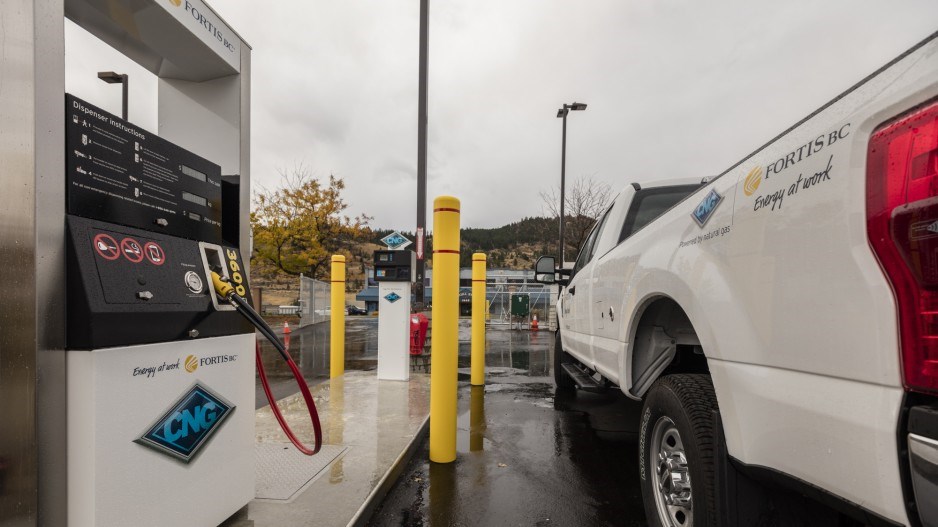With gasoline prices in Vancouver breaking a North American record and threats of Alberta cutting off B.C.’s gas supply, one might expect a spike in electric vehicle sales and increased interest in converting transport trucks from diesel to natural gas.
Anecdotally, New Car Dealers Association of BC CEO Blair Qualey said there appears to be increasing interest in electric vehicles (EVs), but he added that the current spike in gas prices won’t necessarily result in a corresponding spike in EV orders.
While EVs are the alternative vehicle of choice for ordinary consumers, compressed natural gas (CNG) or liquefied natural gas (LNG) are the options favoured by the truck transportation sector.
High diesel prices appear to be piquing interest among trucking companies, many of which are thinking about switching from diesel to natural gas, said Sarah Smith, director of natural gas for transportation with FortisBC.
“Over the last three weeks, we have seen a significant increase in phone calls into our salespeople,” she said.
Gasoline prices in Vancouver in recent weeks have hit highs of $1.61 per litre, and diesel prices have been in the $1.45 to $1.48 range.
“People take a bit of a longer-term view when making a purchase for a car,” Qualey said. “It’s the second-biggest purchase people make in their lives usually. So it’s not like they see a $1.61 gas price and instantly run to their dealer and say, ‘I want an electric vehicle.’
“Over time, if this keeps up, we’ll start seeing some of that direct correlation. At the moment I think we’re seeing a lot of interest, but I don’t know that that’s directly translating into people buying EVs beyond the people who were doing it anyway.”
The biggest obstacles for would-be buyers of EVs are cost, lack of charging infrastructure and range anxiety – all of which are slowly being addressed.
The number of fast-charging stations in B.C. is set to nearly double this year. There are currently 30, which BC Hydro commissioned. An additional 28 are being built this year, 22 of which will be installed in the Lower Mainland and on Vancouver Island. Another six will be built in the Kootenays.
In a recent estimate submitted to the BC Utilities Commission, BC Hydro estimated that the cost of fuelling a Honda Civic averages out to $1,800 a year (based on gas prices of $1.50 per litre), compared with $300 per year for an EV charged nightly at home.
A Clean Energy Vehicle program in B.C. provides rebates of up to $5,000 on the purchase of new battery electric or hybrid electric vehicles.
According to the Ministry of Energy, Mines and Petroleum Resources, 5,000 British Columbians have received rebates for EV purchases under the program since April 2015.
In the past two years, applications increased 50% each year. Between October and December 2017 alone, 537 rebates were paid out.
That doesn’t include Teslas, because the purchase price cutoff for the rebate is $77,000.
The ministry estimates that 40% of EV sales in B.C. have been for vehicles that don’t qualify for rebates.
For the trucking sector, natural gas, which, according to FortisBC, is about 38% cheaper than diesel, is a rising alterntive. FortisBC offers incentives to cover the higher capital costs of switching to natural-gas-burning engines, which can be as high as $100,000. The incentive program can cover up to 80% of the incremental capital costs.
There are now 800 short- and long-haul trucks running on CNG or LNG out of B.C., Smith said.
Trucking companies like Vedder Transport Ltd., Arrow Transportation Systems Inc. and Denwill Enterprises Inc. began converting to natural gas several years ago. TransLink also recently placed an order for 106 new CNG-powered buses.
Converting from diesel to natural gas is good for the environment, because natural gas produces fewer carbon dioxide emissions and pollutants like particulate matter, and is easier on the wallet.
Vedder Transport president Fred Zweep said not only is natural gas cheaper than diesel, but it is also largely free from the wild price fluctuations that gasoline and diesel are subject to, which makes Vedder’s customers happy.
Vedder has a fleet of 350 vehicles, 65 of which run on LNG, using Cummins Westport engines. It will add another 15 LNG vehicles by 2020.
Vedder’s natural gas trucks operate in B.C., Oregon and Washington.
Zweep estimates that on Vedder’s LNG fleet, his company saves between $0.40 and $0.70 per litre, compared with its diesel trucks.
If he had his druthers, Zweep said he would convert the whole fleet to LNG, but some of the longer-haul trucks go to regions of Canada and the U.S. that still do not have sufficient LNG refuelling infrastructure.
“Diesel prices, only in the last four or five months, have climbed $0.46 per litre in the Lower Mainland, when natural gas has decreased in costs,” Zweep said.




